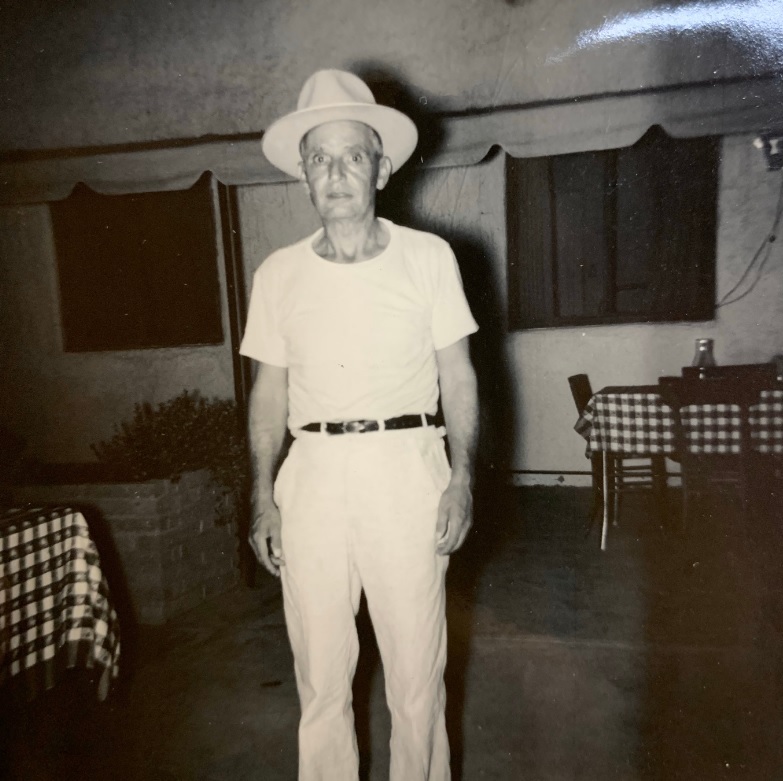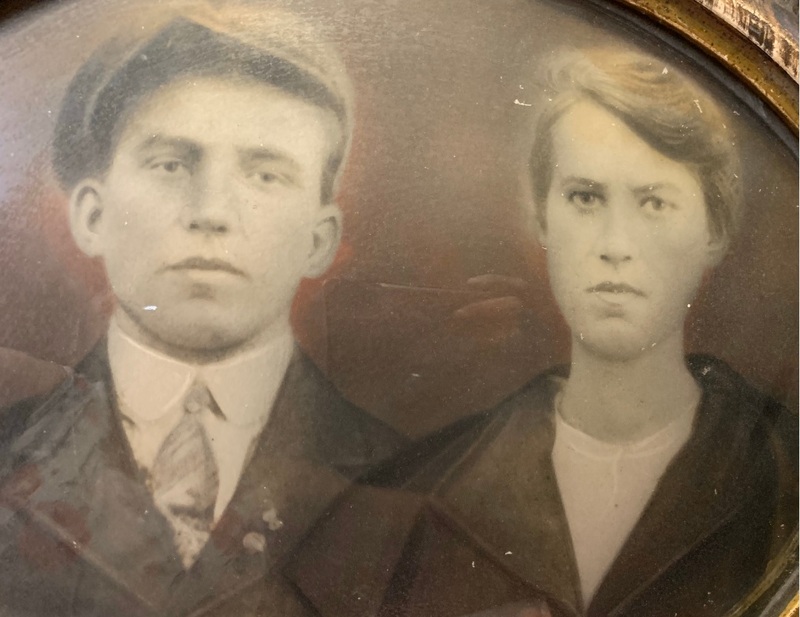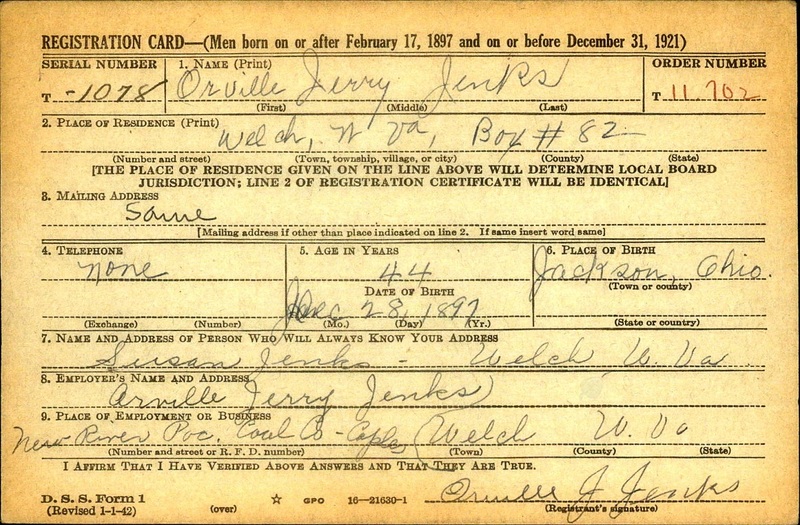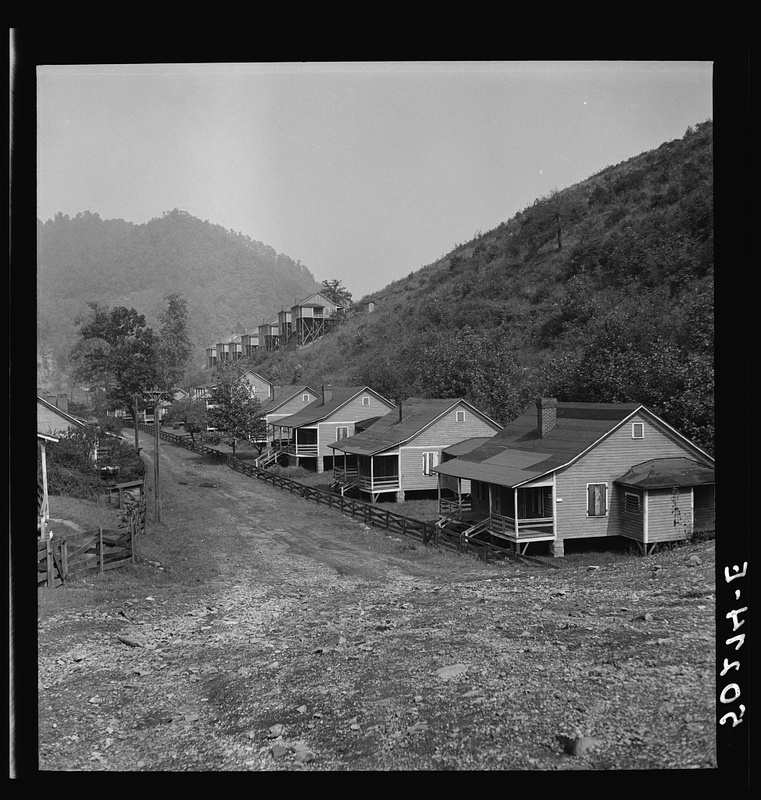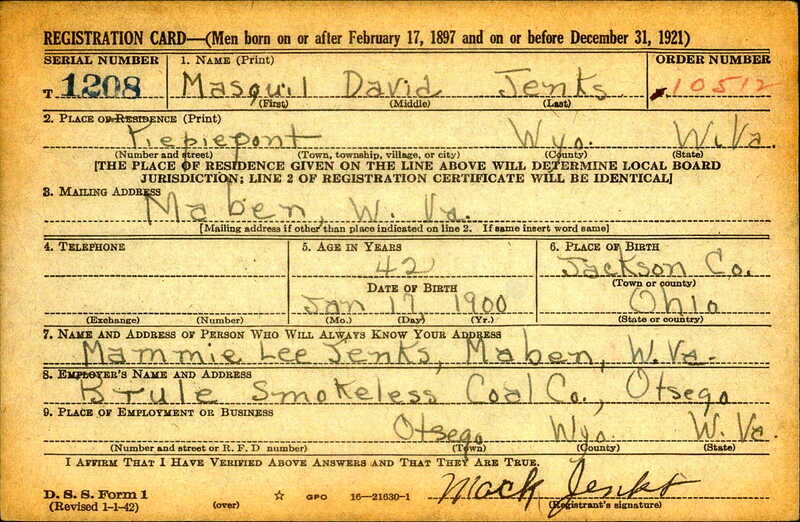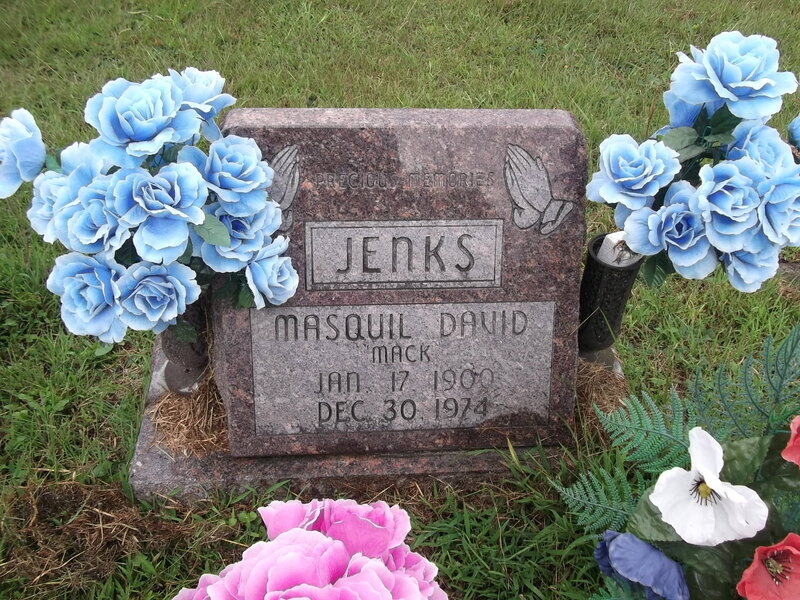Orville and Mack Jenks
Orville Jenks was born on 28 December 1898 in Glen Roy, Coal Township, Jackson County, Ohio. Glen Roy was a mining town established by Andrew Roy, the first chief mine inspector for Ohio. He lived there with his father Masquell David Jenks, mother Ellen Jenks, and siblings Nancy, Charles, George, Amanda, and Henry. His brother Masquell Jenks was born soon after on 1 December 1900. His father worked as a coal miner at the mine in Glen Roy until 1908. In 1908, The family moved to a new coal field opened in Mcdowell County near Welch. They moved to a neighborhood in Coalwood where his father continued to work as a coal miner.
At age 11, Orville also began to work for the mine. At this age, he was too young to work inside of the mine, and so he made money emptying coal cars. (interview) By age 13, he was allowed to swear an affidavit to work for slightly higher wages in the mines. In 1918, he married his wife, Alma Johnston. During this time, he worked as a motorman for the Davy Branch Mine in Roderfield, McDowell County with his brother Mack. He continued to work at the mine as a motorman over the next twenty years, during which time he continued to perform for small gatherings.
In 1935, he had the opportunity to play before the UMWA convention. There he played for the delegates, including John L. Lewis. He played at each meeting over the course of 14 days and made about $270 from donations ($6,445 modern) and gained popularity among the union delegates. Mack and Orville typically played once a month at local union meetings and continued to work in the coal mines during this time. In 1930 he continued to work as a motorman and lived in Browns Creek with his wife and four children, Ruby, James, Alma, and Betty. In 1939, his son James Jenks enlisted with the US Navy and saw action throughout the war, including Normandy and Iwo Jima. In 1940, he worked as a janitor in the POW office in Welch, possibly out of concern for his son, though in 1942 his draft card labels him as self-employed. During this time, he recorded several folk songs which he is known for, including Sprinkle Coal Dust On My Grave and The Dying Mine Brakeman. Songs made by Orville and his brother Mack were personally made lyrics with the tune from other songs. Little Lump of Coal was made to the tune of “The Maple on the Hill”. Orville Jenks died on 06/23/1960 in Alamogordo, Otero County, New Mexico.
Masquell David “Mack” Jenks Jr. was born 01/17/1900 in Jackson, Jackson County, Ohio. He held residence in 1910 with his brother Orville, mother Mary Ellen Jenks, father Masquell David Jenks, and siblings Berdie, Olive, George, and Henry in Coalwood, Mcdowell County. During this time, he attended school during the winter and learned to read and write. The first mine Mack worked in was Hensley Mine, where started work when he was 12 and earned 7 ½ cents per hour working 10 hours per day (about $23 per day modern). His job was to “knock latches” meaning he hit the lever that opens the bottom of a coal car to release the coal when dumping it out. At 13, like his brother, he was required to swear an affidavit in front of a notary board that they would not sue in the event of their death to be able to work in the mine. Working inside the mine he earned 12 ½ cents per hour, where he worked for a total of 44 years.
In 1918, at 18 years old, he married Marine “Mamie” Lester. In 1920-1930, he lived in a rented home in Browns Creek, McDowell County, working as a laborer for the Davy Paea (P*ea, unsure, possibly Davy Branch Mine) Coal Company in Roderfield, McDowell County with his brother Orville. The UMWA didn't move into the area until Summer 1933, and Mack was very enthusiastic about the union and helped organize. Union workers rode in trucks to mining camps to play songs and use check-off cards with signatures to get new members. Mack worked in the Twin Branch Mining Town for Ford in Twin Branch, McDowell County. Rather than let it become unionized as a result of Mack and the union’s efforts, Ford chose to close or rent out the area. The Union workers had to come into mining camps during the night to avoid being caught by “thugs”, who consisted of state police and Baldwin-Felts men. If they were caught, they had to pay them off to be let go.
In 1934 Mack lived in an apartment on the main street of Davy, McDowell, at the time an upstairs room of Goodson’s store in Davy was used as a union hall. By 1940, he moved to Pierpont, Wyoming County, and worked as a Coal Loader for the Brule Smokeless Coal Company. Mack was president of the Ostego local union in Wyoming County in 1940-1941. Mack claims that “Little Lump of Coal”, which Orville recorded around 1940, was his own song. Despite several of their songs featuring a combined effort to make, this one was incorrectly attributed as being made by Orville. Orville was the performer, but Mack created the song. The song “The Dying Brakeman” also known as the Motorman Song, was about a brakeman named Hiram Hall who was killed by a motorman named Charlie Lander (~Landrum). They worked together to run the mine trolley, and Mack knew and worked with them. “A Little Lump of Coal” was composed by Mack around 1934, and his other well-known song “Union Blues” was composed by Mack around 1936~1938.
In 1952 after a divorce, he remarried to Ethel Perkey (his previous wife lived to 2000 and was listed head of house in 1950 census). Mack stopped working in the mines on 4/2/1959, with the last mine he worked in being at Coalwood Road. He died in 12/30/1974 in Big Sandy, McDowell County, West Virginia and is buried in Roderfield.
Sources:
- Moore, Roderick. “Mack Jenks, Union Bard” in Goldenseal, Volume 3 Issue 4, 1978.
- Tribe, Ivan. Mountaineer Jamboree : Country Music in West Virginia. Lexington: The University Press of Kentucky, 1996. https://research.ebsco.com/linkprocessor/plink?id=94b7d700-e583-3c49-830c-ca616af40d47.
- Korson, George Gershon, ed. Coal Dust on the Fiddle : Songs and Stories of the Bituminous Industry. Philadelphia, Pa.: University of Pennsylvania Press, 1943.
Orville Jenks:
- “1900 United States Federal Census” database with images, Ancestry database entry for Orville J Jenka, Line 14-21, https://www.ancestrylibrary.com/discoveryui-content/view/40784422:7602.
- “1910 United States Federal Census” database with images, Ancestry database entry for Jerry Jinks, Line 18-25, https://www.ancestrylibrary.com/discoveryui-content/view/165925590:7884.
- “1930 United States Federal Census” database with images, Ancestry database entry for Jake Jenks, Line 32-37, https://www.ancestrylibrary.com/discoveryui-content/view/100492092:6224.
- “1940 United States Federal Census” database with images, Ancestry database entry for Irvie Jenks, Line 7-11, https://www.ancestrylibrary.com/discoveryui-content/view/148782527:2442.
- “U.S., World War I Draft Registration Cards, 1917-1918” database with images, Ancestry database entry for Orville Jenks, https://www.ancestrylibrary.com/discoveryui-content/view/22524785:6482.
- “U.S., World War II Draft Cards Young Men, 1940-1947” database with images, Ancestry database entry for Orville Jenks, https://www.ancestrylibrary.com/discoveryui-content/view/13064880:2238.
- “West Virginia, US Marriages Index, 1785-1971" database, Ancestry database entry for Jerry Jenks, https://www.ancestrylibrary.com/discoveryui-content/view/725721:2538.
David “Mack” Jenks:
- “1910 United States Federal Census” database with images, Ancestry database entry for Marque D Jinks, Line 18-25, https://www.ancestrylibrary.com/discoveryui-content/view/165925591:7884.
- “1920 United States Federal Census” database with images, Ancestry database entry for Mack D Jenks Jr., Line 1-3, https://www.ancestrylibrary.com/discoveryui-content/view/101290985:6061.
- “1930 United States Federal Census” database with images, Ancestry database entry for Mashel D Jenks, Line 49-50, https://www.ancestrylibrary.com/discoveryui-content/view/100487014:6224.
- “1940 United States Federal Census” database with images, Ancestry database entry for Masquel D Jenks, Line 21-25, https://www.ancestrylibrary.com/discoveryui-content/view/147957350:2442
- “U.S., World War I Draft Registration Cards, 1917-1918” database with images, Ancestry database entry for Masquell David Jenks, https://www.ancestrylibrary.com/discoveryui-content/view/22524784:6482.
- “U.S., World War II Draft Cards Young Men, 1940-1947” database with images, Ancestry database entry for Masquell David Jenks, https://www.ancestrylibrary.com/discoveryui-content/view/13064879:2238.
- “West Virginia, US Marriages Index, 1785-1971" database, Ancestry database entry for Masquie David Jenks, https://www.ancestrylibrary.com/discoveryui-content/view/10728063:2538.
- “West Virginia, US Marriages Index, 1785-1971" database, Ancestry database entry for Mack D Jenks, https://www.ancestrylibrary.com/discoveryui-content/view/707935:2538.
